|
|
|
Sort Order |
|
|
|
Items / Page
|
|
|
|
|
|
|
| Srl | Item |
| 1 |
ID:
137631
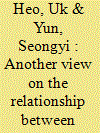

|
|
|
|
|
| Summary/Abstract |
Armed Forces and Society recently published an article, ‘‘Intra-Military Division and Democratization in South Korea’’ by Insoo Kim. In the article, Kim argues that economic development and civil society explanations for South Korea’s democratization are not sufficient because conflict in the military undermined the ability of Chun’s government to suppress the democracy movement, which made the transition possible. We refute Kim’s argument because economic development clearly made significant contribution to South Korea’s democratization by enhancing education attainment and facilitating industrialization and urbanization. Moreover, there is no clear evidence of schism in the military or among political elites, and the authoritarian leader Chun Doo-hwan agreed to change the presidential election system based on his political calculation.
|
|
|
|
|
|
|
|
|
|
|
|
|
|
|
|
| 2 |
ID:
175527
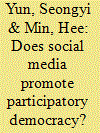

|
|
|
|
|
| Summary/Abstract |
This study examines whether social media contributed to the success of the Korean presidential impeachment protests of 2016–17 and promoted participatory democracy. The 2016–17 candlelight protests contributed to the overthrowing of a corrupt regime. However, was it a victory of participatory democracy? To answer this question, we must first be clear on what kind of participatory democracy is being referred to. Therefore, while social media played a crucial role in the success of the protests, the impact of social media on participatory democracy should be addressed separately. For this purpose, we first analyse the contributions of the digitally connected movements during the 2016–17 protests with two social movement theories: resource mobilisation and collective identity. Second, we examine whether the success of digitally connective movements during those protests promoted participatory democracy. To discuss this issue, we use Arnstein’s concept of a ‘ladder of participation’, which describes participatory democracy as falling within three levels, from non-participation through tokenism to citizen power. This study shows that the proliferation of social media politics by itself does not convert representative democracy into participatory democracy. This implies that even if social media augments citizens’ power of resistance, it cannot transform citizens into a governing power.
|
|
|
|
|
|
|
|
|
|
|
|
|
|
|
|
| 3 |
ID:
164805
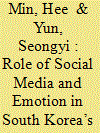

|
|
|
|
|
| Summary/Abstract |
Previous studies have shown that social media is effective in large-scale mobilization, facilitating leaderless and more flexible forms of resistance. However, some scholars argue that this type of mobilization suffers from a lack of organizational form and collective identity. This paper shows that social media-centered networks can in fact promote collective actions powerful enough to challenge a corrupt president. We also prove the role of emotions in collective actions. Using an empirical analysis of the 2016 Presidential Impeachment Protests surrounding “Choi Soon-sil Gate,” we first demonstrate the effects of social media activities on participation in collective actions. Next, we explore the effects of anger on social media activities and participation. In short, this study reveals a new angle on social media’s influence in mobilizing collective actions by analyzing the effect of emotions on participation. In this process, social media activities are escalated by emotional outbreaks, and participation then increases throughout a given collective action.
|
|
|
|
|
|
|
|
|
|
|
|
|
|
|
|
| 4 |
ID:
160388
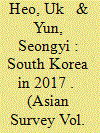

|
|
|
|
|
| Summary/Abstract |
The biggest story of 2017 in South Korea was the impeachment of President Park Geun-hye and the election of Moon Jae-in, shifting power from conservative to progressive. The economy showed signs of recovery despite multiple concerns. The North Korean nuclear crisis intensified tensions in the region.
|
|
|
|
|
|
|
|
|
|
|
|
|
|
|
|
| 5 |
ID:
164947
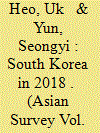

|
|
|
|
|
| Summary/Abstract |
The biggest story of 2018 was a series of summit meetings between US President Donald Trump, South Korean President Moon Jae-in, and North Korean leader Kim Jong-un to discuss the denuclearization of North Korea. The income-led growth policies of the Moon Jae-in administration have not stimulated the economy.
|
|
|
|
|
|
|
|
|
|
|
|
|
|
|
|
| 6 |
ID:
185199


|
|
|
|
|
| Summary/Abstract |
The two biggest stories of 2021 in South Korea were a cutthroat presidential nomination and the nationwide outcry over soaring housing prices. Both the ruling and opposition parties had gone through a noisy and murky nomination process. In 2021, housing prices continued to rise, causing citizens’ anxiety and anger to reach their peak, and the president apologized for the failure of the real estate policy. Despite the maladministration, president Moon Jae-in, unlike previous presidents, did not become a lame duck. Meanwhile, the popularity of Hallyu, or the Korean Wave, continued with the success of the movie Minari, K-pop band BTS, and the Netflix drama series Squid Game.
|
|
|
|
|
|
|
|
|
|
|
|
|
|
|
|
| 7 |
ID:
190032
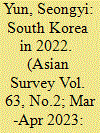

|
|
|
|
|
| Summary/Abstract |
At the presidential and local levels, progressives were replaced by conservatives in 2022. But the National Assembly is still dominated by the opposition Democratic Party, so the government is more divided than ever. As a conservative government came into power in South Korea, North Korea fired the most missiles ever, and inter-Korean relations were very strained. The economy is in serious condition due to inflation, interest rate hikes, and slowing growth.
|
|
|
|
|
|
|
|
|
|
|
|
|
|
|
|
| 8 |
ID:
178393
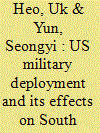

|
|
|
|
|
| Summary/Abstract |
Due to the lack of studies on the effects of US troops on an individual host state, we studied the effects of US troops on South Korea’s politics and economy. Based on security enhancement benefits, we hypothesized that USFK would have positive effects on South Korea’s investment, trade, economic growth, and political development. Employing Heo and Ye’s empirical models, we conducted statistical analyses and found that the effects of USFK on South Korea’s trade, democracy level, and economic growth are statistically insignificant and the effect of USFK on investment is negative and statistically significant. These findings need to be cross-validated with a different measure of estimating USFK’s effects because our measure, size of USFK, may not capture its effects completely although there is no other measure.
|
|
|
|
|
|
|
|
|
|
|
|
|
|
|
|
|
|
|
|
|